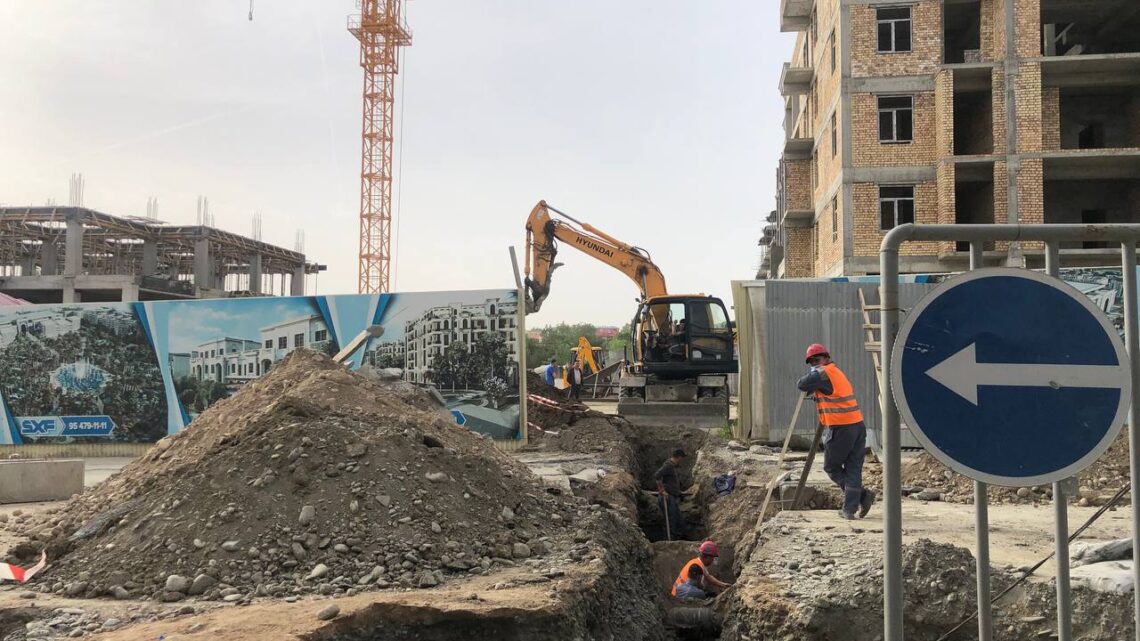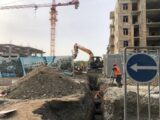Will there be a moratorium on new construction in Tashkent?
26.03.2024The disproportionate and ill-conceived “urbanization” in Uzbekistan over the past seven years, accompanied by massive demolitions and unregulated construction, has had irreversible consequences for the ecology and infrastructure of cities. New buildings put into operation cause enormous strains on the electricity, gas and water supply networks, leading to constant failures. The process of demolition and construction, accompanied by cutting down trees, digging pits, driving heavy machinery with construction materials, all kinds of work with cement and other construction materials have led the capital of Uzbekistan to the top of the world leaders with the most polluted air.
The discontent of the population were heard, as it seemed to everyone, at the highest level of the government.
In September 2021, the Uzbek President Shavkat Mirziyoyev announced plans to reduce construction in Tashkent: “Enough already, if we continue, the sewage system will not withstand, and people will not withstand, and there will be no green area – everything will turn into concrete”. (https://www.gazeta.uz/ru/2021/09/10/new-tashkent/)
In August of the same year, the head of state was concerned that people were worried about the felling of trees and the reduction of green spaces due to point development between houses. According to him, measures are being taken to move new construction in Tashkent and major cities outside the city limits. (https://www.gazeta.uz/ru/2021/08/17/construction/)
“A moratorium on new construction will be imposed in Tashkent until the general plan is adopted, the Uzbek president said. He criticized the lack of accurate calculations of the load on infrastructure when issuing construction permits and ignoring the organization of green spaces,” Gazeta.uz reported on February 8, 2023 citing the press service of the President of the Republic of Uzbekistan (https://www.gazeta.uz/ru/2023/02/08/construction).
January 29, 2024 President Shavkat Mirziyoyev spoke about environmental problems in Uzbekistan at a meeting, his press secretary Sherzod Asadov reported.. Telegram: Contact @Press_Secretary_Uz
The head of state noted that since 2020, 22 thousand new industrial enterprises have been launched in the regions, and almost 250 thousand new houses have been built during this period.
In most cases, construction projects are implemented without environmental expertise. In this regard, from April 1, it was decided to introduce a rating of each region on the level of air, water and environmental pollution. The Ministry of Ecology, Environmental Protection and Climate Change together with khokims and heads of industries have been instructed to develop master plans for each district and city to improve the local environmental situation. Large enterprises of construction materials, energy and metallurgy will have to create “green belts” of 5 hectares and plant a total of 10 million trees. In addition, construction companies, “feeling socially responsible,” must also organize “green belts” in Tashkent.
(https://www.gazeta.uz/ru/2024/01/29/ecology/)
On January 23, 2024, the Ministry of Ecology, Environmental Protection and Climate Change of Uzbekistan announced that it has developed an immediate action plan to improve air quality in Tashkent and other regions of the country (https://www.gazeta.uz/ru/2024/01/23/air-quality-urgent-measures/).
The ministry noted that the draft planned measures were developed as early as May 2023. These proposals have passed the approval stages and are expected to be adopted within the framework of the presidential decree.
In the developed plan, practical measures to solve the problems are planned to be assigned to the responsible ministries and agencies.
According to one of the points of this plan, the Ministry of Construction should have adopted a document by March 1 to ensure the legislative enactment of the announced moratorium on construction in Tashkent, except for objects of social and state importance.
The Hokimiyats of Tashkent and Tashkent oblast were planned to make decisions on allocation of land plots for creation of “green belts” on the area of 440 hectares, as well as 4 green public parks on the area of 5.5 hectares and green spaces on the area of at least 41.4 hectares around and in all districts of Tashkent by February 15.
It is not known what is the fate of the announced plan. Most likely, they did not go further than words. The government of Uzbekistan, apparently stuck firmly in the hands of developers, is clearly not going to curtail construction projects. On the contrary, the appetites of the latter are clearly growing
Thus, on February 27, 2024. Shavkat Umurzakov, the capital’s acting governor, announced that 500 hectares of housing in Tashkent would fall under the renovation program. “According to him, we are talking about “two-storey temporary buildings that have been waiting for years to be resolved,” Gazeta.Uz reports (https://www.gazeta.uz/ru/2024/02/27/renovation/).
It turns out that even a simplified procedure for the implementation of projects on the terms of public-private partnership has been approved, as well as the procedure for the implementation of renovation projects in the capital and cooperation on the basis of a “life cycle contract”. What this means – is not explained, no regulatory legal act on this topic has not been published.
A new state-owned company, Tashkent Invest, together with private businesses, will participate in the renovation projects. This company was established by presidential decree at the end of July 2023 under the founding of the Hokimiyat. The main areas of work of Tashkent Invest are defined as:
– management of municipal property;
– participation in PPP projects as a state partner;
– participation in financing promising projects of entrepreneurs;
– organization of development and renovation programs of separate districts of Tashkent, master plan and project documentation of objects planned for construction.
“Tashkent kengash deputies approved the allocation of 1 trillion soums to form the authorized capital of the state company Tashkent Invest, which is intended to become a ‘bridge’ between the capital’s hokimiyat and business,” Gazeta.uz reported on February 18, 2024, (https://www.gazeta.uz/ru/2024/02/18/toshkent-invest/)
Such a statement by the capital’s acting khokim caused outrage in social networks, and not only. The Milliy Tiklanish party stated that “Renovation of housing in Uzbekistan should be carried out only after the legal framework is established. Otherwise, “there is a chance that processes similar to the demolitions of a few years ago will begin”. Earlier, the Adolat party opposed renovation without a law. This was reported by Gazeta.Uz on February 28, 2024, with reference to the TV channels of these parties. (https://www.gazeta.uz/ru/2024/02/28/renovation/)
Both parties believe that renovation should have a solid legal basis and be conducted with the opinion of homeowners and the general public in mind.
According to Article 49 of the Constitution, draft urban planning documents are subject to public discussion in accordance with the procedure established by law.
“With many investors coming to Uzbekistan and tourism developing, it is necessary to preserve Tashkent’s ancient and historically significant buildings, high-rise residential buildings, the historical look and architecture of the city as a whole. Therefore, we believe that it is expedient for the government and the Tashkent khokimiyat to implement renovation programs only after the law on renovation is developed and adopted by parliament,” Milli Tiklanish said in a statement.
However, despite the concerns of the public and political parties, on March 12 this year at a meeting on the construction of housing and massifs “Yangi Uzbekiston” in 2024, President Shavkat Mirziyoyev instructed to auction an additional 60 hectares of land for housing construction in Tashkent. (https://www.gazeta.uz/ru/2024/03/13/construction)
It is unclear where the khokim of Tashkent will find 60 hectares of free land in the densely populated city. According to the provisions of Articles 7, 8 and 9 of the Law “On Local State Power” (https://lex.uz/docs/112168), khokimiyats can only manage the property of a region, district or city within the limits established by the legislation of the Republic of Uzbekistan, i.e. municipal or communal property.
By virtue of Article 23 of the Land Code of RUz (https://lex.uz/docs/149947), granting a land plot in possession, use, lease and ownership is made only after withdrawal of this plot in an established order.
The Ministry of Justice of RUz indicated that transfer of land plots from one individual or legal entity to another within the framework of investment project realization is not considered a state and public need. (www.gazeta.uz/ru/2021/04/09/lands/)
by Farida Sharifullina


